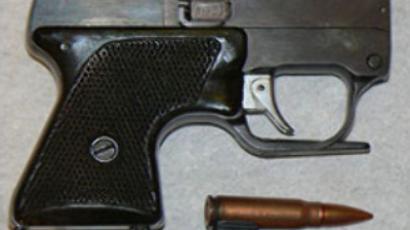Beslan remembered as country unites against terror threat
A day of solidarity in fighting terrorism has been observed all across Russia on the third anniversary of the Beslan school siege. People have gathered there to commemorate 334 hostages killed.
September 3 has become a day of remembrance as well as a day of vigilance and responsibility. Two years ago it became a national day of solidarity in the fight against terrorism. When linked to the Beslan school siege, September 3 becomes all the more significant for Russia as the country continues its struggle against the threat of terrorism.
334 white balloons were released in Beslan on Monday, each representing one of the victims who died there three years ago. At minute's silence was observed by locals. Russian Orthodox clergymen performed a service at a graveyard where victims are buried.
334 white balloons have been released in Beslan on Monday, each of them representing one of the victims who died there three years ago. People have honoured them with a minute's silence and a group of Russian Orthodox clergymen have performed a service at a graveyard where victims are buried.
Meanwhile in Moscow a special event called Bez Slov – that means 'Without Words' – was held to remember victims of Beslan.
The event organised by youth movements took place on Pushkinskaya Square in the centre of the city. The participants stopped people on the street and encouraged them to place candles by a memorial, dedicated to victims of the Beslan tragedy.
The event was launched in 2005, to commemorate the first anniversary of the school siege and has taken place annually ever since.
Also on Monday President Vladimir Putin and members of the Russian government observed a minute’s silence to commemorate the victims of terrorist acts.
On September 1, 2004, a group of Chechen separatists took about 1,200 people, mostly children, hostage in a school in Russia's southern republic of North Ossetia.
They had been been held in the gym for three days when on September 3 chaos broke out at school number one and 334 hostages were killed.
It was decided they would be buried together – because they had spent those last tortured days of their lives so close to each other in the school’s gym. 186 of the graves are those of children. Fortunately, many more children survived but they are now dealing with the aftermath of the horror they lived through.
Soon after the tragedy a new school was built. The children of Beslan now have a new park to play in and a museum which displays hundreds of thousands of letters of condolence sent from children around the world.
There are plans to build a church on the old school’s grounds but the gym will remain as it is. The school has become a shrine for those whose loved ones were killed there.
Hundreds have come to pay their respects during the three official days of mourning. Some leave flowers, others toys, but most leave water in memory of their loved ones who were deprived of it for days.
War against terrorism: Russia still in the firing line
Back then, President Putin described it as an attack on all of Russia and called for society to mobilise to resist what he called “a total and full-scale war” to splinter the country.
Three years on, Russia is still in the firing line.
In mid-August a bomb derailed an express train travelling from Moscow to St. Petersburg, overturning carriages and injuring dozens of passengers.
Soon afterwards President Putin admitted the country had not done enough to eliminate the threat of terrorism.
His position was supported by the Head of Russia's Federal Security Service Nikolay Patrushev, who has linked the train bombing to the Chechen insurgency.
“We have been able to significantly reduce the number of terrorist attacks. Nevertheless, the threat of extremism and terrorism has not been removed once and for all,” Nikolay Patrushev said.
Meanwhile, Arkady Baskaev, a member of the State Duma committee on national security and the Beslan tragedy investigation board, says the authorities have learnt a lesson from the Beslan tragedy.
“The Beslan tragedy has taught us a serious lesson. The law on terrorism has been passed to finally define the term ‘terrorism’ and what measures should be taken to fight it. An anti-terror committee has established anti-terror headquarters in all regions of Russia. These are people who are always ready to react. It is due to their work that more than a hundred terror attacks have been prevented since the Beslan tragedy,” he stressed.
Russia isn't the only place that continues to be hit by the terrorists.
A series of bombings rocked the rail network in Madrid killing 191 people in 2004. The official investigation by the Spanish Judiciary determined the attacks were directed by an Al-Qaeda-inspired terrorist cell, but no direct Al-Qaeda participation has been established.
In July of the same year a series of co-ordinated bomb blasts hit three London underground trains and one bus killing 52 commuters and causing massive disruption to the city's transport.
Last year the Russian FSB on behalf of the National Anti-terrorist Committee proposed that the Chechen militants give up their arms and begin to negotiate with federal or local authorities.
“We guarantee a fair and unbiased approach to all those who decide to give up their arms. Those who were deceived and tricked by criminal groups' leaders into joining the militants will have a chance to resume a normal, peaceful life. Those who still pursue illegal activities will be punished,” Nikolay Patrushev stated.
Russia has allocated millions of dollars to the protection of its borders and fighting those who finance terrorists. Despite this, the threat of attacks still remains high.













